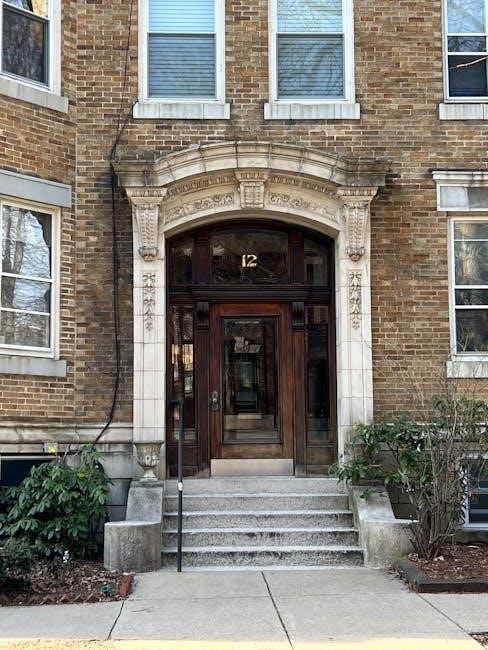
al anon 12 steps and 12 traditions pdf
Al-Anon’s 12 Steps and 12 Traditions, adapted from AA, provide a spiritual framework for families of alcoholics to find peace and recovery. These guidelines foster personal growth, unity, and fellowship.
What is Al-Anon?
Al-Anon is a worldwide fellowship of individuals who share their experiences, strength, and hope as family and friends of alcoholics. It is a separate organization from Alcoholics Anonymous (AA) but uses similar tools, including the 12 Steps and 12 Traditions, to support emotional recovery. Al-Anon’s primary purpose is to help members achieve peace and serenity, regardless of whether the alcoholic in their life seeks help. Meetings provide a safe space for sharing personal stories, gaining insights, and learning how to apply the program’s principles to daily life. Unlike AA, Al-Anon focuses on the well-being of the family and friends rather than the alcoholic themselves. By practicing the 12 Steps and Traditions, members find solutions to the challenges of living with someone affected by alcoholism, fostering personal growth and spiritual renewal. The program is free, confidential, and open to anyone affected by another’s drinking. Al-Anon empowers individuals to rebuild their lives and find joy, even in difficult circumstances.
Importance of the 12 Steps and 12 Traditions in Al-Anon
The 12 Steps and 12 Traditions are the cornerstone of Al-Anon’s program, offering a pathway to emotional and spiritual recovery for families and friends of alcoholics. The 12 Steps provide practical tools for personal growth, helping members transform their lives and find peace, while the 12 Traditions ensure the unity and survival of Al-Anon groups. Together, they foster a sense of community and shared purpose. The Steps guide individuals in letting go of resentment, accepting reality, and developing a deeper spiritual awareness. The Traditions promote selflessness, anonymity, and collective responsibility, ensuring that Al-Anon remains a safe and welcoming space for all. By following these principles, members learn to focus on their own well-being rather than trying to control the alcoholic. This balanced approach to recovery has empowered countless individuals to rebuild their lives and find serenity, even in the face of challenging circumstances.

The 12 Steps of Al-Anon
The 12 Steps of Al-Anon, adapted from AA, guide members through a spiritual and emotional transformation. They help families of alcoholics move from denial to acceptance and personal growth.
Overview of the 12 Steps

The 12 Steps of Al-Anon are a spiritual framework designed to help families and friends of alcoholics recover from the emotional and mental impact of addiction. Adapted from Alcoholics Anonymous (AA), these steps guide members through a journey of self-discovery, acceptance, and personal growth. The steps emphasize surrendering to a Higher Power, taking personal responsibility, and making amends to improve relationships. They also encourage spiritual awakening and service to others. Each step builds on the previous one, fostering emotional healing and empowerment. By working the steps, Al-Anon members learn to focus on their own well-being rather than the alcoholic’s behavior. The 12 Steps are not a cure-all but a pathway to serenity, understanding, and a more fulfilling life. They are often revisited and applied in daily life to maintain progress and resilience in the face of challenges.
A Detailed Breakdown of Each Step
The 12 Steps of Al-Anon are a structured program for personal recovery, guiding members through a journey of self-reflection, spiritual growth, and healing. Step 1 encourages admitting powerlessness over alcohol and recognizing the unmanageability of life. Step 2 involves believing in a Higher Power that can restore sanity. Step 3 is about turning one’s will and life over to this Higher Power. Step 4 requires a fearless moral inventory, while Step 5 involves admitting wrongs to oneself, another person, and God. Step 6 prepares members to have their defects of character removed, and Step 7 humbly asks God to remove these shortcomings. Step 8 lists all harmed individuals and becomes willing to make amends. Step 9 involves making direct amends wherever possible. Step 10 suggests continuing to take personal inventory and promptly admitting wrongs. Step 11 focuses on improving conscious contact with a Higher Power through prayer and meditation. Step 12 emphasizes carrying the message to others and practicing these principles in daily life.
Applying the 12 Steps in Daily Life
Applying the 12 Steps in daily life is a transformative process that fosters personal growth, emotional resilience, and spiritual well-being. Members begin by practicing Step 1, acknowledging powerlessness and unmanageability, which helps them let go of control over others. Step 3 encourages surrender to a Higher Power, promoting trust and faith in daily challenges. Step 4’s moral inventory becomes a tool for self-reflection, helping members identify patterns and behaviors to improve. Step 5’s confession fosters honesty, while Step 9’s amends-making heals relationships. Steps 10 and 11 emphasize ongoing self-awareness and spiritual connection through prayer and meditation. Step 12, carrying the message, inspires service to others, reinforcing the program’s principles. By integrating these steps into routines, Al-Anon members cultivate compassion, humility, and peace, improving their interactions and overall well-being. This daily practice not only supports individual recovery but also strengthens relationships and fosters a sense of community and purpose.

The 12 Traditions of Al-Anon
The 12 Traditions of Al-Anon are guidelines for group unity and harmony, ensuring anonymity, and maintaining focus on the primary purpose. They promote selflessness, responsibility, and spiritual growth.
Overview of the 12 Traditions
The 12 Traditions of Al-Anon are essential guidelines for maintaining group unity, integrity, and focus on the primary purpose of helping families of alcoholics. These traditions emphasize anonymity, non-affiliation with external organizations, and the importance of spiritual growth. They promote selflessness, responsibility, and harmony within meetings, ensuring that the group remains a safe and supportive environment for all members. The traditions also highlight the need for financial self-support, avoiding public controversy, and maintaining a clear distinction between Al-Anon and other organizations. By following these principles, Al-Anon groups foster a culture of respect, inclusivity, and shared purpose. The 12 Traditions are not rules but guidelines to help members navigate challenges and ensure the fellowship’s longevity. They provide a framework for personal growth and collective responsibility, enabling Al-Anon to remain a vital resource for those seeking recovery and understanding.
A Tradition-by-Tradition Analysis
The 12 Traditions of Al-Anon are analyzed individually to understand their unique role in fostering group unity and personal recovery. The First Tradition emphasizes unity and the importance of group survival over individual opinions. The Second Tradition highlights the collective conscience guided by a Higher Power. The Third Tradition focuses on inclusivity, welcoming anyone affected by another’s drinking. The Fourth Tradition underscores the autonomy of each group. The Fifth Tradition clarifies the primary purpose of helping families of alcoholics. The Sixth Tradition avoids affiliation with external organizations. The Seventh Tradition ensures financial self-support. The Eighth Tradition manages public relations responsibly. The Ninth Tradition encourages group participation without formal leadership. The Tenth Tradition avoids public controversy. The Eleventh Tradition protects anonymity. The Twelfth Tradition emphasizes spiritual growth through service. Each Tradition offers practical wisdom, ensuring Al-Anon remains a haven for recovery and support.
The Role of Traditions in Maintaining Group Unity
The 12 Traditions of Al-Anon play a vital role in maintaining group unity and ensuring the fellowship’s continued success. By adhering to these principles, members foster a safe and supportive environment where everyone can focus on personal recovery. The Traditions promote harmony by resolving conflicts and preventing divisions. They encourage selflessness, anonymity, and spiritual growth, reminding members that the group’s survival depends on unity. The First Tradition, emphasizing unity, and the Second, focusing on collective conscience, guide decisions that benefit the group as a whole. These principles also protect the anonymity of members, ensuring confidentiality and trust. By following the Traditions, Al-Anon groups avoid external distractions and remain focused on their primary purpose: helping families of alcoholics. This collective commitment to the Traditions ensures that Al-Anon remains a united and effective fellowship for all members seeking recovery and support.

Al-Anon Meetings


Al-Anon meetings provide a safe space for families of alcoholics to share experiences and find support. They focus on the 12 Steps and Traditions, offering comfort and guidance for recovery.
Types of Al-Anon Meetings
Al-Anon meetings vary to accommodate different needs and preferences. In-person meetings provide face-to-face connection, while virtual meetings offer accessibility for those unable to attend physically. Topic-focused meetings explore specific themes, such as the 12 Steps or Traditions. Step study meetings delve deeply into each Step, fostering a structured recovery journey. Beginner meetings are tailored for newcomers, explaining the program’s basics. Some groups incorporate meditation or literature study, enhancing spiritual growth. Regardless of the format, all meetings emphasize sharing experiences, offering support, and applying Al-Anon’s principles to daily life. This diversity ensures members can find a setting that resonates with their personal journey and recovery goals.
What Happens in an Al-Anon Meeting?
An Al-Anon meeting provides a safe, confidential space for members to share their experiences and find support. Meetings typically begin with a welcome and the Serenity Prayer. Key readings, such as the 12 Steps and 12 Traditions, are often shared to guide discussion. Members take turns sharing their personal stories, focusing on their own recovery and growth, rather than the alcoholic. The sharing is done without interruption or advice-giving, fostering an atmosphere of understanding and empathy. Meetings may also include discussions on Al-Anon literature or specific topics related to the 12 Steps and Traditions. The emphasis is on personal growth, spiritual principles, and mutual support. Meetings conclude with a closing prayer, such as the Lord’s Prayer, and announcements about future events or resources. The goal is to help members find peace, hope, and direction in their lives, free from the influence of someone else’s alcoholism.